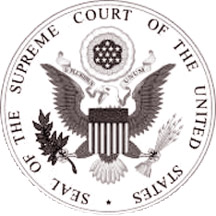UN Special Rapporteur breaches Code of Conduct
Dr Kamal Wickremasinghe
As discussed in the editorial of this newspaper on January 3, the
comments of the ‘UN Special Rapporteur’ on the independence of judges
and lawyers’, a lady by the name of Gabriela Knaul, are based on
partisan information she has received from the (foreign) Government
Organised Non-Governmental Organisation (GONGO) minders of the chief
justice (CJ).
|

US Supreme Court |
Based on this information, Ms Knaul has intervened in Sri Lanka’s
domestic affairs for the second time within a month by expressing
“serious concern” about the impeachment proceedings.
There are several incredible, unproven, and unprovable, accusations
in her media statement: without the support of statistics, she has
concluded that attacks and threats against members of the judiciary and
lawyers, as well as interference in their work, have “dramatically
increased” over the past few months. She also charges that impeaching
the CJ “appears to be” for asserting independence. She goes on to add
that the procedure for the removal of the CJ is extremely “politicised”
and lacks transparency, due process and fair trial.
Anyone objectively looking at the facts and circumstances surrounding
the CJ’s impeachment case and its management is bound to easily see that
all the above assertions and accusations are ridiculously wrong; There
is absolutely no evidence to support her accusations other than her
GONGO informants’ whispers that the CJ is suffering “for asserting
independence”.
There is a perfectly clear, publicly available list of alleged
commercial, financial and other impropriety which the CJ has chosen not
to answer. It was her GONGO-led minders who took the case to the
political arena as their singular strategy of her defence. The
politicisation of the case cannot be blamed on others.
Therefore the baseless charges of Gabriela Knaul against the
government on the impeachment issue should be cast aside as rubbish.
However, the general context of Knaul’s forceful attempt to create a
human rights issue out of the impeachment case cannot be ignored simply
as grandstanding by a career minded UN volunteer holding a peripheral
post: she is part of the infrastructure the US and European countries
superimposed on the UN system to take control of the developing world
using their version of human rights as the major tool.
The UN mandate holders and their mechanisms
 The network of Special Rapporteurs(a French word meaning ‘reporter’),
Special Representative of the Secretary-General and Independent Experts
is part of the international system the Americans created in the last
three decades or so, to haul the ‘recalcitrant’ nations over the coal
under bogus charges of human rights violations; GONGOs are the other
indispensable component of this infrastructure. The network of Special Rapporteurs(a French word meaning ‘reporter’),
Special Representative of the Secretary-General and Independent Experts
is part of the international system the Americans created in the last
three decades or so, to haul the ‘recalcitrant’ nations over the coal
under bogus charges of human rights violations; GONGOs are the other
indispensable component of this infrastructure.
This special group of individuals is collectively referred to in UN
language as “mandate-holders”. They do not receive any financial
compensation by the UN for their work, but receive personnel and
logistical support from the Office of the United Nations High
Commissioner for Human Rights (OHCHR).
The special rapporteur job is nothing but a glorified ‘internship’
opportunity for those with right UN contacts to build a lucrative future
career as a ‘human rights professional’.A mandate-holder’s tenure is
limited to two terms of three years, and Knaul seems to have just
started her second term.
The mandate holder network comes within the scope of “Special
Procedures” mechanisms of the UN, established by the western governments
at the Human Rights Council (HRC), purportedly to address either
‘specific country situations’ or ‘thematic issues’ relating to human
rights in all parts of the world.
The two procedures that form the SP mechanisms, “1235” and “1503”,
each named after the Economic and Social Council resolution establishing
them, entail public discussion and confidential proceedings
respectively, of alleged human rights violations by countries.
In essence, the “mechanisms” provide a formal avenue for individuals
(agents) and GONGOs in developing countries to clandestinely lodge
complaints of ‘human rights abuses’ against national governments, to
allow the granting of UN ‘mandates’ to special rapporteurs, independent
experts or working groups to look at a particular country or a thematic
issue. Knaul is currently trying to act on such ‘complaints’ from the
Hong Kong based GONGO activist, Basil Fernando.
From its dubious, Western-sponsored beginnings the special procedures
mechanisms have evolved into a monstrous tool used to haul sovereign
developing country governments over the coal on flimsy charges of ‘human
rights violations’. Currently, there are 36 thematic and 12 country
specific mandates. Not surprisingly, the list of countries with mandate
holders appointed to conduct inquisitions against them is the same as
those resisting Western dictates: Iran, Belarus, Somalia, North Korea
and Myanmar are just a few.
An example of the self-serving and non-productive nature of the
‘work’ of the 37 mandate holders was the “joint statement on the
importance of human rights in the fight against poverty”, issued
collectively by them to mark the Human Rights Day in 2006: they seem to
think that the lack of the Western version of human rights, the right to
protest against democratically elected governments, is the prime cause
of poverty in the world!
|

Gabriela Knaul |
Due to developing country protests over the methods used by special
rapporteurs, especially their alliances with anti-government elements in
the countries they focus on, the HRC attempted to clip their wings in
1997 by adopting a Code of Conduct for special procedures mandate
holders, and disallowed them to address the media. Article 3(f) of the
Code orders that mandate holders, “Neither seek nor accept instructions
from any government, individual, governmental or non-governmental
organisation or pressure group whatsoever.”
Knaul insults the Sri Lankan Constitution
The disturbing aspect of Knaul’s media releases is that she appears
to, knowingly or unknowingly, entangle herself in a number of issues
that far exceed her mandate. She is also in clear breach of the Code of
Conduct by relying on biased information and instructions from GONGOs.
The implied threat in Ms Knaul’s statement that “I would like to
reiterate that article 107 of the Sri Lankan Constitution, read together
with Standing Orders of Parliament, is contrary to international human
rights law”is highly offensive to Sri Lanka as a sovereign and equal
member of the UN; Knaul’s remark suggests that, as far as she is
concerned, Sri Lanka can ‘shove’ its Constitution and they should do
things according to what she calls the “international human rights law”.
Her observation and the implied threat are irrelevant because the
CJ’s impeachment case does not even remotely resemble a human rights
issue: it relates to the conduct of the bearer of one of the highest
offices in the democratic governance structure of Sri Lanka. Pushing
such a ‘behavioural’ or disciplinary issue including the parliamentary
process in to the arena of human rights is a ludicrous and cynical
exercise on the part of Knaul.
Apart from the fact that the impeachment case does not involve human
rights issues, Knaul needs to understand that the so-called
international human rights law is an airy-fairy concept that has barely
taken root beyond Western capitals and her office in Geneva. Her attempt
to bring Sri Lanka under some sort of universal jurisdiction by casting
aspersions over the country’s Constitution deserves contempt.
In Sri Lanka, Constitution reigns supreme
As to any real or imaginary conflict between Sri Lanka’s Constitution
and the international law Knaul wishes to impose, the Sri Lankan
Constitution holds sway: the situation is not different to America where
the Supremacy Clause of the US Constitution declares them to be supreme
law of the land.
As recently as 2009, the US Supreme Court Justice Sonia Sotomayor
explicitly stated during Senate confirmation hearings that “American law
does not permit the use of foreign law or international law to interpret
the Constitution and that there is no debate on that question.”Also,
Florida Representative Sandy Adams introduced a bill to forbid the US
Supreme Court from ever citing or using any precedent from international
law. During her tabling of the Bill, Ms Adams said, “The Constitution
laid the foundation for our nation’s judicial system, and allowing
foreign law to supersede it in any capacity leads to its erosion. Not
only is using international precedent a transparent disregard for the
Constitution, but it could be used to advance a judge’s personal
political agenda over the best interests of the nation.” Sri Lanka
chooses to adopt the same stance.
While Sri Lanka may choose to respect the basic legal architecture of
human rights promotion and protection under the UN Charter and the
network of treaties subsequently ratified, Knaul should not expect Sri
Lanka to take seriously her observations on any conflict some
unspecified ‘international law’ may have with the country’s
Constitution.
According to her resume, Knaul has worked as a judge in Brazil and is
an expert in criminal justice and the administration of judicial
systems: it may well be she is unfamiliar with constitutional
jurisprudence, or she could be applying a different standard to Sri
Lanka.
Sri Lankans can well remember that several international enterprises
sought to unduly intervene in the crucial domestic battle against
terrorism, under the guise of protecting human rights that went against
the definition of sovereignty and the basic principles of Article 2 of
the UN Charter that emphasises the importance of respect for sovereignty
and the principle of non-intervention.
Knaul seems to be indiscreetly swallowing all the material sent to
her by politically desperate anti-government elements and Sri Lankan
GONGOS: she needs to urgently revisit the OHCHR guidelines on
admissibility of communications related to a violation of human rights
including the requirements that they should not have manifestly
political motivations and should contain factual description of the
rights which are alleged to be violated.
Our message to Knaul is that, the CJ’s impeachment does not involve
human rights issues and if it did, the enforcement of international
human rights law is a matter solely within the domestic jurisdiction of
Sri Lanka. As an unpaid UN mandate holder, she needs to find some other
‘project’ to keep busy and to prove investigative credentials. |







